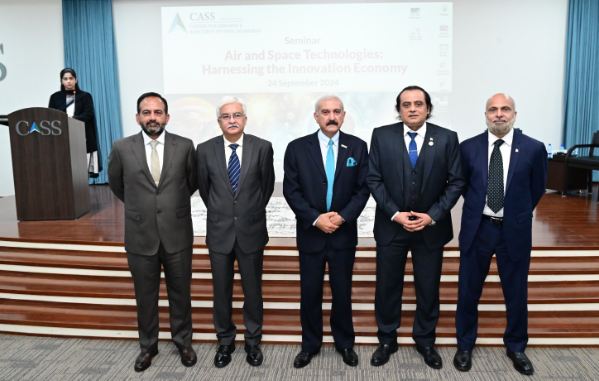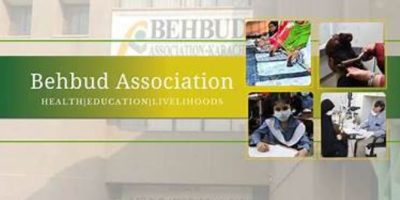Experts stress strategic investments in space technologies for Pakistan’s economic growth

ISLAMABAD, 24 Sept /DNA/ – The Centre for Aerospace & Security Studies (CASS), Islamabad, successfully concluded a seminar on the ‘Air and Space Technologies: Harnessing the Innovation Economy.’ This event convened distinguished experts from the defence, technology, and academic sectors to discuss strategies for leveraging space and technological advancements to prosper in an innovation-driven economic landscape in Pakistan.
Air Vice Marshal Nasser Wyne (Retd), Director (Aerospace Warfare) at CASS, set the stage for the seminar sharing how the rise of air power in the Twentieth Century transitioned into aerospace power, incorporating space exploration, satellite technology, and autonomous systems. This shift, he stressed, presents strategic opportunities for nations to bypass traditional developmental barriers and capitalise on cutting-edge innovations for both defence and economic growth. AVM Wyne further asserted that the innovation economy, fueled by the commercialisation of new technologies, was playing a crucial role in this transformation.
In his Keynote Address on ‘Future of Air and Space in National Defence and the Global Innovation Economy’, Air Marshal Zahid Mehmood (Retd), Former Vice Chief of the Air Staff, Pakistan Air Force, highlighted the evolution of aerospace from a defence-centric industry to a key driver of economic growth and technological innovation. He pointed out that while the sector originated in military needs, it has since expanded to foster commercial aviation, space exploration, and private sector involvement. He asserted that technological advancements in areas like satellite deployment, AI, and space exploration are creating new markets and opportunities globally. To capitalise on these, he emphasised the need for strategic investments and the development of skilled human capital, warning that countries that fail to adapt may fall behind. The Air Marshal also stressed the need for developing countries, like Pakistan, to harness aerospace innovations through strategic investments, technology transfer, and human capital development. He urged policymakers to foster public-private partnerships (PPPs) and invest in building capacity to secure their position in the rapidly evolving aerospace landscape.
In his presentation on ‘Space and Technology Nexus: Boosting National Security & Economic Prosperity,’ Dr Najam Abbas Naqvi, Chairman National Centre for GIS and Space Applications, outlined how advancements in satellite technology, earth observation, and global navigation systems are providing innovative solutions for sectors like agriculture, urban planning, and disaster management. Dr Naqvi acknowledged the importance of building a skilled workforce and fostering collaborative research between academia and industry to further leverage these technologies. He urged policymakers to incentivise private sector involvement through funding and tax benefits while advocating for the establishment of aerospace innovation clusters to drive research and commercialisation. Dr Naqvi stressed that leveraging PPPs would be essential in sharing risks and advancing large-scale space projects. He forecasted that with the right strategies in place, Pakistan could position itself to benefit from the growing global space economy, projected to be worth USD 1.8 trillion by 2035.
In his address on ‘Aerospace Evolution in Pakistan: Initiatives and Impacts,’ Air Vice Marshal Dr Liaquat Ullah Iqbal, Director General Public Relations & Publications at the National Aerospace Science and Technology Park (NASTP), outlined the strategic vision behind PAF’s flagship initiative. He articulated the critical role of NASTP as the driving force for the Triple Helix Model, highlighting the interconnectedness of the IT, computing, and aerospace industries. Dr Iqbal provided an overview of the various initiatives undertaken under NASTP’s infrastructure, which spans five cities, each focusing on distinct domains. He also briefly touched upon the business strategies and future prospects of innovative technologies and their incubation within NASTP. Commending the collaborative efforts of multiple ministries, he emphasised the critical role played by thorough documentation and approvals at various levels in securing the Special Economic Zone (SEZ) status for NASTP. He affirmed that youth development, private sector engagement, diaspora outreach, and international collaborations are essential pillars for NASTP’s sustained growth, positioning it as a key player in advancing Pakistan’s aerospace sector.
In his Concluding Remarks and Vote of Thanks, Air Marshal Javaid Ahmed (Retd), President CASS Islamabad, articulated the need to evaluate both the positive and negative aspects of technology. He remarked that the Ukraine conflict highlighted how unmanned systems are reshaping modern warfare, while the recent events in Beirut underscored the growing risk of consumer technology weaponisation. He stressed that technology was evolving rapidly; delivering solutions at an unprecedented pace but oversight and regulations remain far behind. President CASS also warned that if the global technological divide between East and West deepens, Pakistan might be forced to make a critical choice. He acknowledged Pakistan’s pockets of excellence in academia and among individuals, advocating for the continued harnessing of these capabilities. In the end, he reflected on the enduring spirit of indigenisation and innovation in the country, which, he asserted, remains key to future progress.
The seminar was followed by active participation from a diverse audience, including retired military officers, scholars, journalists, and students, who engaged in an interactive question and answer session, enriching the discourse on this critical subject.
Related News

Newspaper body APNS decries govt Ad ban on Dawn, warns of industry crisis
The APNS expressed its grave concern on the complete stoppage of Govt. advertisements to DawnRead More

Serena Hotels partners with Behbud Association for charity gala
ISLAMABAD, FEB 3 /DNA/ – Serena Hotels, through its Cultural Diplomacy Initiative, partnered with theRead More


Comments are Closed